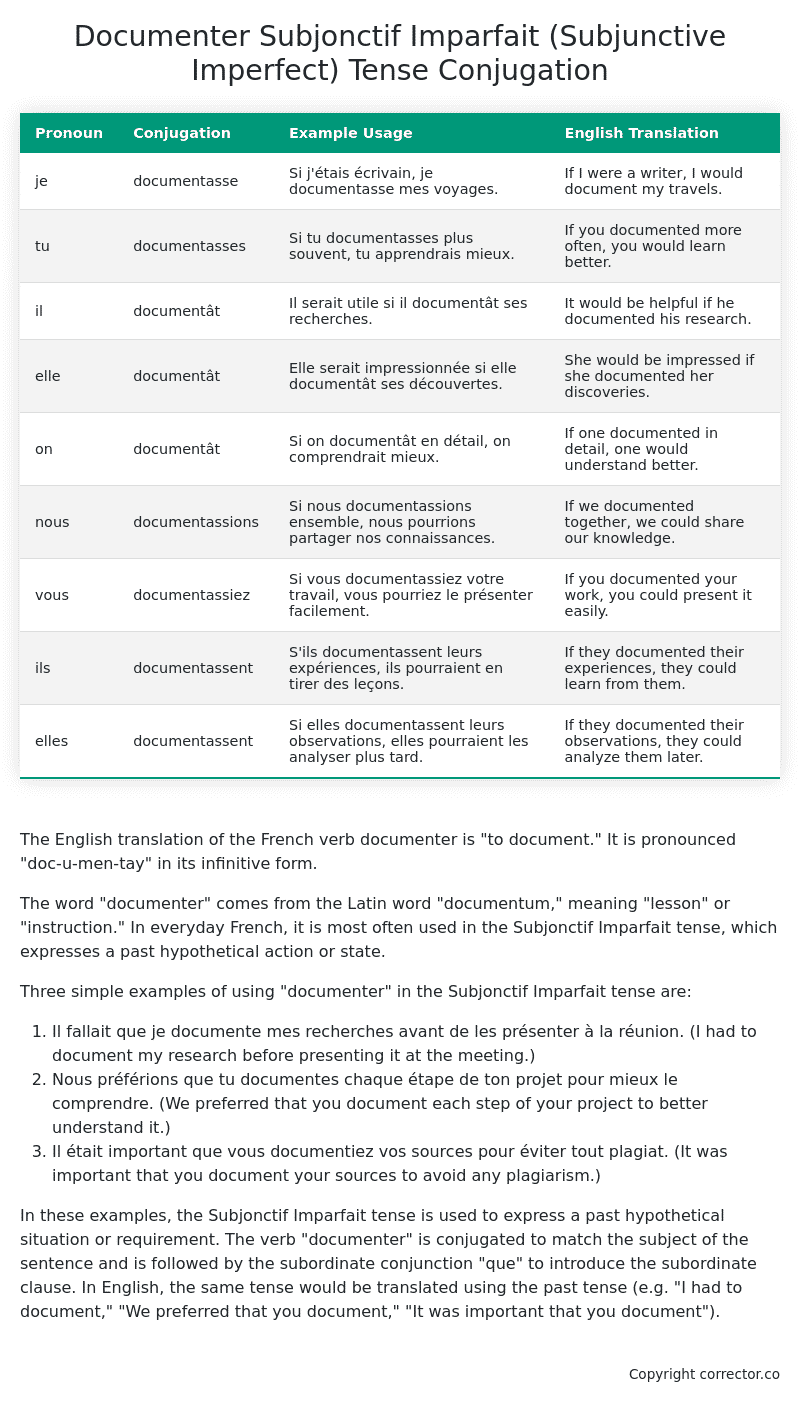Subjonctif Imparfait (Subjunctive Imperfect) Tense Conjugation of the French Verb documenter
Introduction to the verb documenter
The English translation of the French verb documenter is “to document.” It is pronounced “doc-u-men-tay” in its infinitive form.
The word “documenter” comes from the Latin word “documentum,” meaning “lesson” or “instruction.” In everyday French, it is most often used in the Subjonctif Imparfait tense, which expresses a past hypothetical action or state.
Three simple examples of using “documenter” in the Subjonctif Imparfait tense are:
- Il fallait que je documente mes recherches avant de les présenter à la réunion. (I had to document my research before presenting it at the meeting.)
- Nous préférions que tu documentes chaque étape de ton projet pour mieux le comprendre. (We preferred that you document each step of your project to better understand it.)
- Il était important que vous documentiez vos sources pour éviter tout plagiat. (It was important that you document your sources to avoid any plagiarism.)
In these examples, the Subjonctif Imparfait tense is used to express a past hypothetical situation or requirement. The verb “documenter” is conjugated to match the subject of the sentence and is followed by the subordinate conjunction “que” to introduce the subordinate clause. In English, the same tense would be translated using the past tense (e.g. “I had to document,” “We preferred that you document,” “It was important that you document”).
Table of the Subjonctif Imparfait (Subjunctive Imperfect) Tense Conjugation of documenter
| Pronoun | Conjugation | Example Usage | English Translation |
|---|---|---|---|
| je | documentasse | Si j’étais écrivain, je documentasse mes voyages. | If I were a writer, I would document my travels. |
| tu | documentasses | Si tu documentasses plus souvent, tu apprendrais mieux. | If you documented more often, you would learn better. |
| il | documentât | Il serait utile si il documentât ses recherches. | It would be helpful if he documented his research. |
| elle | documentât | Elle serait impressionnée si elle documentât ses découvertes. | She would be impressed if she documented her discoveries. |
| on | documentât | Si on documentât en détail, on comprendrait mieux. | If one documented in detail, one would understand better. |
| nous | documentassions | Si nous documentassions ensemble, nous pourrions partager nos connaissances. | If we documented together, we could share our knowledge. |
| vous | documentassiez | Si vous documentassiez votre travail, vous pourriez le présenter facilement. | If you documented your work, you could present it easily. |
| ils | documentassent | S’ils documentassent leurs expériences, ils pourraient en tirer des leçons. | If they documented their experiences, they could learn from them. |
| elles | documentassent | Si elles documentassent leurs observations, elles pourraient les analyser plus tard. | If they documented their observations, they could analyze them later. |
Other Conjugations for Documenter.
Le Present (Present Tense) Conjugation of the French Verb documenter
Imparfait (Imperfect) Tense Conjugation of the French Verb documenter
Passé Simple (Simple Past) Tense Conjugation of the French Verb documenter
Passé Composé (Present Perfect) Tense Conjugation of the French Verb documenter
Futur Simple (Simple Future) Tense Conjugation of the French Verb documenter
Futur Proche (Near Future) Tense Conjugation of the French Verb documenter
Plus-que-parfait (Pluperfect) Tense Conjugation of the French Verb documenter
Passé Antérieur (Past Anterior) Tense Conjugation of the French Verb documenter
Futur Antérieur (Future Anterior) Tense Conjugation of the French Verb documenter
Subjonctif Présent (Subjunctive Present) Tense Conjugation of the French Verb documenter
Subjonctif Passé (Subjunctive Past) Tense Conjugation of the French Verb documenter
Subjonctif Imparfait (Subjunctive Imperfect) Tense Conjugation of the French Verb documenter (this article)
Subjonctif Plus-que-parfait (Subjunctive Pluperfect) Tense Conjugation of the French Verb documenter
Conditionnel Présent (Conditional Present) Tense Conjugation of the French Verb documenter
Conditionnel Passé (Conditional Past) Tense Conjugation of the French Verb documenter
L’impératif Présent (Imperative Present) Tense Conjugation of the French Verb documenter
L’infinitif Présent (Infinitive Present) Tense Conjugation of the French Verb documenter
Struggling with French verbs or the language in general? Why not use our free French Grammar Checker – no registration required!
Get a FREE Download Study Sheet of this Conjugation 🔥
Simply right click the image below, click “save image” and get your free reference for the documenter Subjonctif Imparfait tense conjugation!

Documenter – About the French Subjonctif Imparfait (Subjunctive Imperfect) Tense
Formation
Common Everyday Usage Patterns
Interactions with Other Tenses
Subjonctif Présent
Indicatif Passé Composé
Conditional
Conditional Perfect
Summary
I hope you enjoyed this article on the verb documenter. Still in a learning mood? Check out another TOTALLY random French verb conjugation!


